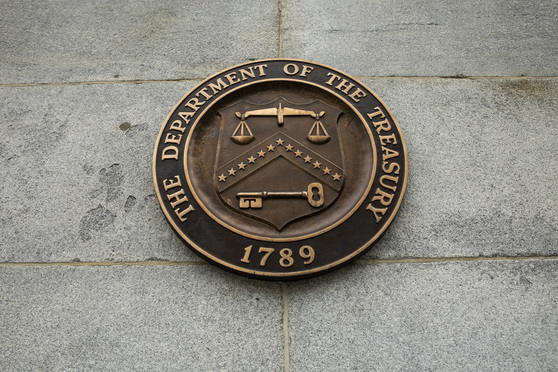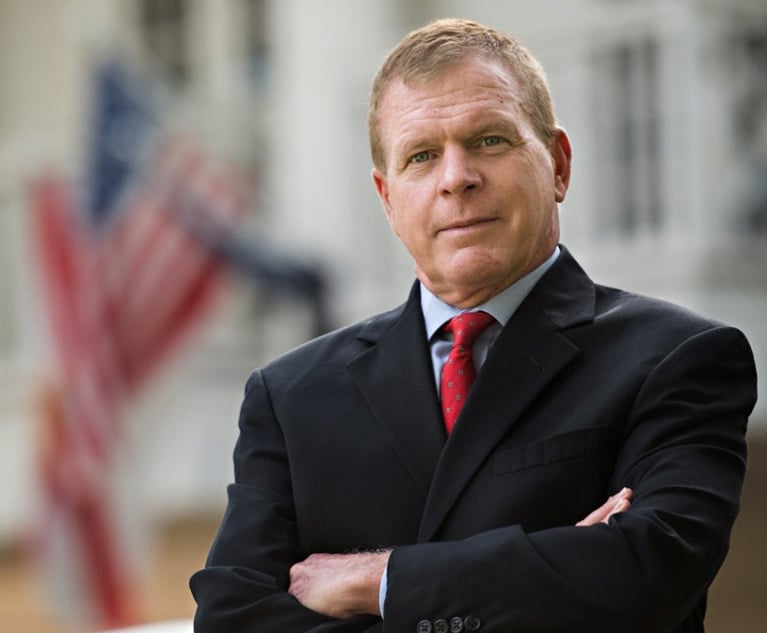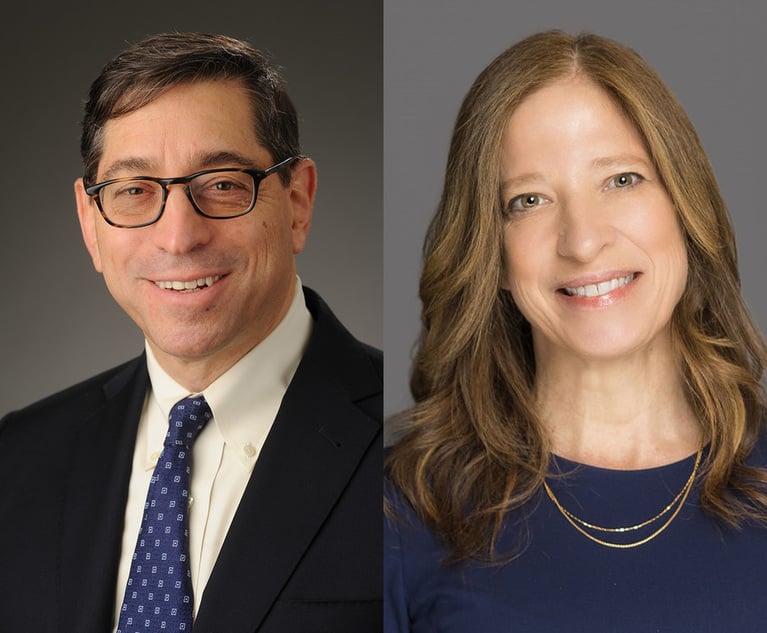The Treasury Wants Its PPP Money Back by May 7. Will We Level the Playing Field for Small Businesses?
Scant and inconsistent instruction from the Treasury Department has wrought havoc among small business owners seeking emergency funding under the Paycheck Protection Program. It's time for Congress to step in with answers.
April 29, 2020 at 05:48 PM
6 minute read
 U.S. Department of the Treasury in Washington, D.C.
U.S. Department of the Treasury in Washington, D.C.
The U.S. Treasury Department last week quietly added new guidance to its Paycheck Protection Program. In doing so, the Treasury second-guessed itself, and small business borrowers, by saying PPP loans went to companies that may not have faced imminent "significantly detrimental" financial harm. On Tuesday, Treasury Secretary Steven Mnuchin announced a "full review" of any loan that exceeds $2 million.
We propose a new amnesty program to address the significant missteps made in the PPP program to date.
The PPP's goal—to help America's small businesses survive the health and financial crisis caused by the novel coronavirus—stands beyond reproach. However, when launched, the program provided scant guidance to potential borrowers on what qualified as "need."
Businesses applying for PPP loans had to certify in good faith that "the uncertainty of current economic conditions makes necessary the loan request to support the ongoing operations." The government failed to clarify this further. Did the business have to be out of money, or in danger of running out soon (and if "soon," by when)? Must that danger have arisen solely (or mainly) from COVID-19?
Many anxious business owners did not pause to unbundle the loan application's vague "need certification" language as they hurriedly applied for relief loans. Indeed, the Treasury urged small businesses "to apply as quickly as you can because there is a funding cap."
The Treasury Department issued revised guidance April 23 to clarify the standard of need and to convince companies that do not meet the revised standard to return PPP loans. That has wrought havoc. In failing to provide clear guidelines for the PPP in the first instance and rewriting requirements in the second instance, the Treasury has whipsawed small business, forcing many to hurriedly consider repaying loans already received or risk potential fraud prosecutions, public scorn and civil litigation.
The Treasury's latest guidance, in FAQ 31, calls into question the legality of a substantial number of already-issued PPP loans. The Treasury now, retroactively, instructs all PPP borrowers to take "into account their current business activity and their ability to access other sources of liquidity sufficient to support their ongoing operations in a manner that is not significantly detrimental to the business." Borrowers did not undertake such an analysis prior to certifying their PPP applications (because that standard did not exist).
While many lawyers are unaccustomed to a "significantly detrimental" standard, the Treasury's intent is clear: applying a stricter filter than "uncertainty of current economic conditions," which borrowers had certified at least a week earlier as the SBA approved 1,661,367 loans totaling $3,422,779,991 by April 16. Many business owners who had legitimately obtained PPP loans following the Treasury's then-articulated vague guidance have spent or earmarked the money and must now return it.
Our experience tells us that there will likely be a proliferation of criminal investigations, criminal and civil fraud claims, and private-party litigation against companies that received PPP loans. Clearly, some of the money went to the wrong companies, but a far larger share of the potential misallocation of money stemmed from the Treasury's own failure to provide clear guidance amidst anxiety that was (and remains) high.
Even the Treasury's April 23 guidance was unclear, as the department released a clarification Tuesday, in FAQ 37. The upshot: all small business owners who received PPP loans are forced to quickly reassess whether they "needed" those loans under the Treasury's new standard, as those with boards of directors frantically reconvene meetings during the 14 days between publishing FAQ 31 and the May 7 deadline for repayment under the "Limited Safe Harbor." The Treasury will deem a borrower's initial certification of need to have been in good faith, where the PPP loan is fully repaid on or before May 7. While this may address a borrower's concerns about potential federal prosecution, it fails to address other concerns, such as whether returning the loans may be viewed as an admission of misconduct for purposes of civil litigation, public scrutiny, and reputational harm.
The whiplash among small businesses is palpable.
There is a better way to do this so that those committed to fair play don't get punished and limited federal funds go to those in greater need.
We strongly encourage Congress to immediately enact an amnesty program. Smoothing the path for companies to repay the PPP loans they now believe do not meet the Treasury's after-the-fact standards could help augment much-needed funds for a next round of PPP funding. Just as importantly, an amnesty program would reaffirm fairness in our system.
The amnesty program we propose would provide that:
- Borrowers who applied for PPP loans before enactment of the amnesty program, and who return the funds in full (no interest) within 30 days of the amnesty program's enactment, would receive immunity from government prosecution and from private causes of action with respect to those loans.
- Borrowers repaying the loans under the amnesty program would be treated under the law as though they had not applied for or received PPP loans, and thus no Freedom of Information Act disclosures would be made.
- The Treasury should use the replenished funds to provide other small businesses with loans.
There are good faith PPP borrowers out there who would more readily undo their applications and repay the funds if they could do so without penalty or scrutiny. Establishing a federal government amnesty program, as we suggest, would free up funds for immediate use by the over 700,000 pending PPP applicants, which is unequivocally a good thing. It would also stem the coming flood of public and private lawsuits and quell some of the backlash against borrowers who are now being second-guessed. Finally, it is fair—which is what this critically important financial program should be.
Ed Zimmerman, an adjunct professor at Columbia Graduate School of Business, chairs the tech group at Lowenstein Sandler. Anne Milgram, a law professor at New York University and former New Jersey attorney general, is special counsel at the firm. Kathleen McGee, former bureau chief for internet and technology for the New York State Attorney General's Office, serves in the firm's tech and white collar criminal defense groups.
This content has been archived. It is available through our partners, LexisNexis® and Bloomberg Law.
To view this content, please continue to their sites.
Not a Lexis Subscriber?
Subscribe Now
Not a Bloomberg Law Subscriber?
Subscribe Now
NOT FOR REPRINT
© 2025 ALM Global, LLC, All Rights Reserved. Request academic re-use from www.copyright.com. All other uses, submit a request to [email protected]. For more information visit Asset & Logo Licensing.
You Might Like
View All

Restoring Antitrust: Returning to the Consumer Welfare Standard

New York Mayor Adams Attacks Fed Prosecutor's Independence, Appeals to Trump
5 minute read
Law Firms Mentioned
Trending Stories
- 1Uber Files RICO Suit Against Plaintiff-Side Firms Alleging Fraudulent Injury Claims
- 2The Law Firm Disrupted: Scrutinizing the Elephant More Than the Mouse
- 3Inherent Diminished Value Damages Unavailable to 3rd-Party Claimants, Court Says
- 4Pa. Defense Firm Sued by Client Over Ex-Eagles Player's $43.5M Med Mal Win
- 5Losses Mount at Morris Manning, but Departing Ex-Chair Stays Bullish About His Old Firm's Future
Who Got The Work
J. Brugh Lower of Gibbons has entered an appearance for industrial equipment supplier Devco Corporation in a pending trademark infringement lawsuit. The suit, accusing the defendant of selling knock-off Graco products, was filed Dec. 18 in New Jersey District Court by Rivkin Radler on behalf of Graco Inc. and Graco Minnesota. The case, assigned to U.S. District Judge Zahid N. Quraishi, is 3:24-cv-11294, Graco Inc. et al v. Devco Corporation.
Who Got The Work
Rebecca Maller-Stein and Kent A. Yalowitz of Arnold & Porter Kaye Scholer have entered their appearances for Hanaco Venture Capital and its executives, Lior Prosor and David Frankel, in a pending securities lawsuit. The action, filed on Dec. 24 in New York Southern District Court by Zell, Aron & Co. on behalf of Goldeneye Advisors, accuses the defendants of negligently and fraudulently managing the plaintiff's $1 million investment. The case, assigned to U.S. District Judge Vernon S. Broderick, is 1:24-cv-09918, Goldeneye Advisors, LLC v. Hanaco Venture Capital, Ltd. et al.
Who Got The Work
Attorneys from A&O Shearman has stepped in as defense counsel for Toronto-Dominion Bank and other defendants in a pending securities class action. The suit, filed Dec. 11 in New York Southern District Court by Bleichmar Fonti & Auld, accuses the defendants of concealing the bank's 'pervasive' deficiencies in regards to its compliance with the Bank Secrecy Act and the quality of its anti-money laundering controls. The case, assigned to U.S. District Judge Arun Subramanian, is 1:24-cv-09445, Gonzalez v. The Toronto-Dominion Bank et al.
Who Got The Work
Crown Castle International, a Pennsylvania company providing shared communications infrastructure, has turned to Luke D. Wolf of Gordon Rees Scully Mansukhani to fend off a pending breach-of-contract lawsuit. The court action, filed Nov. 25 in Michigan Eastern District Court by Hooper Hathaway PC on behalf of The Town Residences LLC, accuses Crown Castle of failing to transfer approximately $30,000 in utility payments from T-Mobile in breach of a roof-top lease and assignment agreement. The case, assigned to U.S. District Judge Susan K. Declercq, is 2:24-cv-13131, The Town Residences LLC v. T-Mobile US, Inc. et al.
Who Got The Work
Wilfred P. Coronato and Daniel M. Schwartz of McCarter & English have stepped in as defense counsel to Electrolux Home Products Inc. in a pending product liability lawsuit. The court action, filed Nov. 26 in New York Eastern District Court by Poulos Lopiccolo PC and Nagel Rice LLP on behalf of David Stern, alleges that the defendant's refrigerators’ drawers and shelving repeatedly break and fall apart within months after purchase. The case, assigned to U.S. District Judge Joan M. Azrack, is 2:24-cv-08204, Stern v. Electrolux Home Products, Inc.
Featured Firms
Law Offices of Gary Martin Hays & Associates, P.C.
(470) 294-1674
Law Offices of Mark E. Salomone
(857) 444-6468
Smith & Hassler
(713) 739-1250








